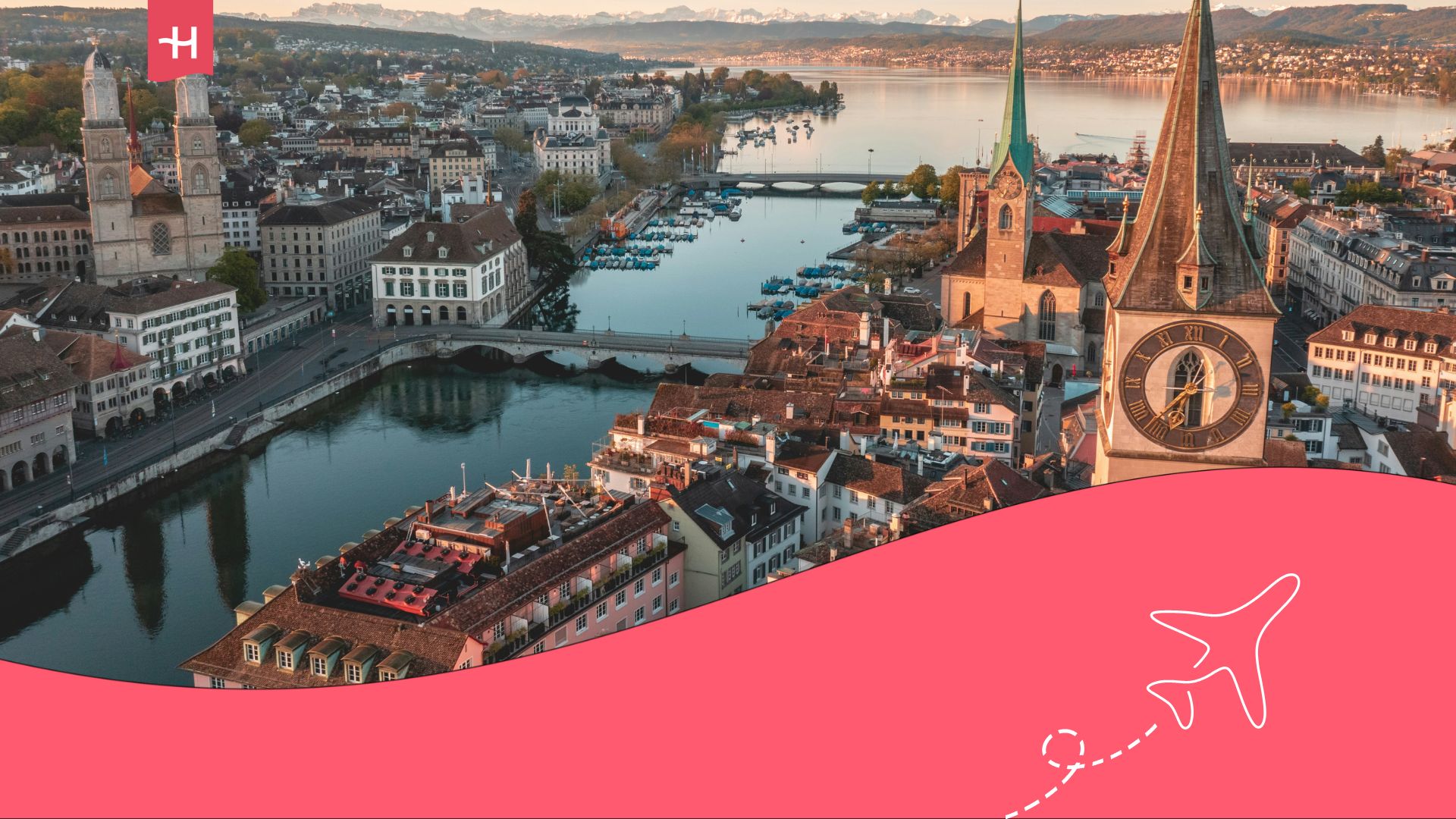How to work in Belgium: Opportunities and requirements
Discover how to work in Belgium: requirements, salaries, cost of living, and the best platforms for finding employment.
Work in Belgium and you’ll find it’s about much more than getting a job. It means becoming part of a multicultural environment, enjoying great connections, and benefiting from a job market that welcomes international talent. While Brussels offers many of the top opportunities thanks to its European institutions and global companies, other cities also excel in sectors such as technology, healthcare, and logistics.
If you’re interested in living and developing your career in this country, here you’ll find the main advantages, requirements, and the best ways to find a job so you can start off on the right foot.
Advantages of working in Belgium
Working in Belgium gives you the chance to grow in a multicultural environment, with competitive salaries, strong employee benefits, and a lifestyle that combines stability and quality at the heart of Europe.
- An internationally oriented job market: Brussels, the capital, is home to European institutions and many multinational companies, making the country a gateway to skilled jobs in fields like technology, finance, healthcare, logistics, and public policy. For foreigners, it also means being part of a diverse environment with plenty of networking opportunities.
- Good salaries and solid collective agreements: The minimum wage in 2025 is over $2,457 per month, and in many sectors, collective agreements further increase this amount. Additionally, contracts often come with clear benefits that provide security and stability.
- Employee benefits: Employees are entitled to at least 20 days of paid vacation plus 10 national holidays, and in many cases they also receive a “13th month” or bonus payment. This makes personal and financial planning much easier.
- Flexibility: One of the most appreciated benefits is the option to work four days a week, keeping the same total hours while gaining an extra day off for personal life.
- Accessible healthcare system: When you join a mutual health fund, much of your medical costs are covered, and you also have the option to add private insurance for extra protection.
- Social protection and stable working environment: In Belgium, sick leave, maternity and paternity leave, and even workplace accidents are all supported by the state. The country provides a well-regulated and predictable framework, making it a secure place to work.
- A multilingual and open environment: You don’t have to be fluent in French or Dutch to get by, as English is commonly spoken in Brussels and in international companies, which makes settling in much easier.
- A demanding tax system, but with returns: Taxes are progressive and can feel high, but they come with access to a strong network of public services and social benefits that make them worthwhile. There are also agreements in place to prevent double taxation.
Requirements for working in Belgium
Here’s a guide to the key things you should know before starting work in Belgium, from the necessary documents to language requirements and local procedures.

- If you’re from the EU, EEA, or Switzerland, you can work in Belgium without a visa. If you come from outside these regions, you’ll need a work and residence permit, which is usually handled by your employer.
- This is the standard procedure for non-EU nationals planning to work for more than three months. It combines a work and residence permit into a single process. Your employer applies to the regional authorities where you’ll be working, and if approved, your residency is tied to your job.
- The former “B permit” has been replaced by short- and long-term work authorizations. The authorities send the authorization directly to your employer, and with that document, you can apply for your visa if needed.
- EU Blue Card (for highly skilled professionals): An option for those with a job contract and a salary above the annual threshold set by each region. The authorities update the amounts every year, so make sure to check the current rates for Flanders, Brussels, or Wallonia.
- Belgium has three official languages: Dutch, French, and German. In Brussels, English is commonly used in multinational companies and international organizations, but knowing one or two local languages can greatly increase your opportunities and help you settle in. Actiris provides support for newcomers who don’t yet speak French or Dutch.
- Once you arrive, you’ll need to sign up at your local town hall to obtain your residence card and national ID number. Several cities offer clear guidance to help foreign workers navigate the process.
- Health insurance: You need to join a mutual health fund. When applying for your single permit, your employer can handle the registration for you upon arrival. After that, make sure to keep your membership active to continue receiving medical reimbursements.
- If you work in a regulated profession such as healthcare or education, you may need to have your diploma recognized. The responsible authority depends on the region. For example, NARIC Vlaanderen handles recognition in the Dutch speaking community.
- Contract and basic documentation: Keep your job contract or binding offer, valid passport, background check (if required for the role), CV, and proof of qualifications ready. These specific requirements can vary by sector and region, so always check with your employer and the relevant regional authority.
Tips for starting work in Belgium
- By registering at your local municipality, you get your national ID number and, for non-EU citizens, your residence permit is confirmed. Without this step, you won’t be able to do essential things like open a bank account or access social security.
- Confirm that your employer has submitted the DIMONA notification, thus ensuring your contributions and rights to vacation and benefits.
- Get connected from day one: Internet providers usually take some time to set up a local plan because they require a permanent address and a bank account. In the meantime, a monthly Holafly plan is very convenient. You can activate it as soon as you arrive and have internet right away.
- In Brussels, you can use the MoBIB card for the metro, bus, and tram, but you can also pay directly with your bank card or your phone using contactless payment.
- Always have your important documents ready: Your passport, job contract, proof of registration, or the single permit letter if you are not from the EU. You will need these documents for banks, insurance, renting, and even when signing up for courses.
Types of jobs in Belgium for foreigners
If you are thinking of working in Belgium, you will be happy to know that there is a wide range of opportunities where you can fit in, depending on your profile and experience:
- Service sector and international institutions: Brussels is home to many European Union agencies, NGOs, and global companies. You can find roles in project management, finance, administration, sales, or event coordination, making it perfect for anyone who enjoys a dynamic, international environment.
- Technology and IT: Whether you are a frontend developer, cybersecurity specialist, or data analyst, there is strong demand from companies looking for tech talent, especially in hubs like Brussels and Antwerp.
- Health, pharmacy, and life sciences: Belgium stands out in medical research, laboratories, and biotechnology. If you work in healthcare or clinical research, you can find well-paid positions with good career growth opportunities.
- Construction, logistics, and industry: Belgium’s central location and excellent transport links create high demand for engineers, technicians, logistics and construction specialists. There are also opportunities for people with technical or trade skills.
- Education and languages: English teachers (TEFL), language assistants, and teachers in bilingual programs are in demand.
- Hospitality and tourism: If you’re good with people and have experience in customer service, you can find jobs in hotels, bars, or as a tour guide, especially during peak seasons.
The most in-demand jobs in Belgium for foreigners
If you are considering moving or are already packing your bags, these are the areas where people like you are most needed.

- Technology and digital development: High demand for profiles in AI, cybersecurity, Python, Java, .NET, data, and biotechnology.
- Engineering and construction: From industrial engineers to construction and logistics specialists, there is a significant gap between supply and demand in infrastructure and green projects.
- Healthcare and medical care: Nurses, clinical staff, and laboratory technicians are in high demand, especially in areas like Wallonia where the need for these professionals is particularly strong.
- Education and training: There are openings for language teachers in bilingual programs and international schools. Being fluent in English along with French or Dutch gives you an extra advantage. In regions like Wallonia, there is also a demand for specialized teachers.
- Logistics, transportation, and industry: Warehouse technicians, production operators, and transport-related roles such as drivers or team supervisors are in demand. This is especially important in an export-driven and strategically positioned economy like Belgium’s.
Salaries and cost of living in Belgium
Salaries in Belgium are competitive by European standards. The average gross monthly pay ranges from about $4,450 to $4,680, which leaves roughly $2,808 to $2,925 after taxes. In Brussels, salaries are generally higher due to the presence of European institutions and large multinational companies. In sectors like technology, healthcare, and finance, pay can easily exceed the average, making Belgium a very attractive destination for international professionals.
When it comes to the cost of living, a single person typically needs between $1,755 and $2,106 per month to cover rent, utilities, transport, and food, though in Brussels it can rise to around $2,457. With the average salary, you can live comfortably and even save, especially in cities that are more affordable than the capital.
Important: If you are a frequent traveler and want to stay connected without worrying about expensive roaming or looking for a new SIM at every destination, Holafly’s subscription plans are for you. With a single eSIM, enjoy internet in more than 170 countries for a fixed price and no surprises on your bill. Travel without limits and connect easily and securely! 🚀🌍

Where can you find job opportunities in Belgium?
When looking for work in Belgium, you have a variety of options to explore, including official job websites, recruitment agencies, international platforms, and European programs.
- Public employment services: Each region has its own service: Actiris in Brussels, VDAB in Flanders, and Le Forem in Wallonia. They are more than just job boards. They also provide language courses, career guidance, and training to help you adapt more easily to the local job market.
- European institutions and international organizations: Brussels is the EU capital, so it’s no surprise that there are many opportunities with EU Careers (EPSO), NATO, and even in embassies or NGOs. In addition, sites like EuroBrussels and Euractiv JobSite bring together jobs in politics, communications, and international cooperation.
- Private and specialized portals: Platforms like StepStone, Jobat, and ICTjob.be are great for finding jobs across a wide range of sectors, from technology to logistics.
- Employment and recruitment agencies: If you’re looking for something more immediate, you can turn to agencies like Randstad, Adecco, or Manpower, which often handle both temporary positions and longer-term contracts across a wide range of fields.
- European mobility programs: Through EURES, the European Union’s job portal, you can search for openings in Belgium from your home country and get free guidance from specialized advisers.
- Temporary or seasonal jobs: Belgium also offers opportunities in agriculture, hospitality, and logistics through specific short-term permits. They offer a great way to get started if you want to try working in the country.
Frequently asked questions about working in Belgium
It depends on your nationality. If you are from the EU, EEA, or Switzerland, you do not need one. If you come from outside these regions, you will need a work and residence permit, and your employer usually arranges it for you.
In Brussels, English will open many doors for you, but speaking French or Dutch greatly increases your opportunities and helps you fit in better on a day-to-day basis.
The cost of living varies depending on the city. A single person typically spends between $1,755 and $2,106 per month, though in Brussels it can reach around $2,457. With the average salary, you can maintain a comfortable standard of living.
The most in demand are technology, healthcare, logistics, engineering, education, and international institutions based in Brussels.
When you start working, you must join a mutual insurance company, which reimburses you for most of your medical expenses. This is a basic requirement for residing and working in the country.





 Language
Language 


















 No results found
No results found








